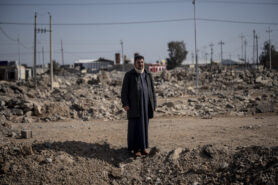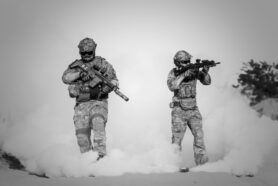In their latest book publication, IRW’s Jip van Dort, Lauren Gould, and Marrit Woudwijk bring together researchers, politicians, NGOs, lawyers, and victims of the 2015 Dutch F-16 bombing of Hawija to reflect on how advanced militaries increasingly wage war from a distance, and how this can have a devastating impact on civilians as well as decrease our ability to exert democratic control over the wars waged in our name.
As the Dutch MoD increases its defence budget by forty percent and intends to invest this money in an additional six F-35s (on top of the 46 already ordered) and arming eight new MQ-9 Reaper drones while also announcing new civilian harm transparency policies, this book is crucial reading for those who want to draw lessons from our recent history to understand the future of warfare. From an inter- and transdisciplinary perspective, it lends insight into the fundamental issues and questions that arise when engaging in remote warfare for both the civilians on the receiving end as well as our own democratic values of transparency and accountability.
Summary book:
On the night of the 2nd of June 2015, the US-led Coalition bombed an Islamic State munition factory in the city of Hawija, Iraq. This leads to a huge secondary explosion that immediately destroys an entire neighborhood and kills at least 85 civilians. In its wake, however, nobody is allowed to know who carried out the attack and the Coalition does not publicly acknowledge the civilian harm done. It takes four years before Dutch investigative journalists discover that in fact the Netherlands was responsible.
How could so many civilian casualties perish in Hawija, despite the Coalition following targeting procedures and using precision weapons? Why was the identity of the belligerent and the number of civilian casualties kept a secret for so long? What impact did the attack and its aftermath have on Iraqi victims as well as Dutch democracy? And what does all this tell us about the nature of contemporary warfare?
This book brings together researchers, politicians, NGOs, victims, and lawyers to reflect on these questions. Focussing on Hawija, the book reveals the devastating realities of remote wars and calls for an honest debate on civilian harm.
Dort, J. van, L. Gould, and M. Woudwijk. 2022. Hawija: De Verwoestende Werkelijkheid van Onze Langeafstandsoorlog Tegen IS.



